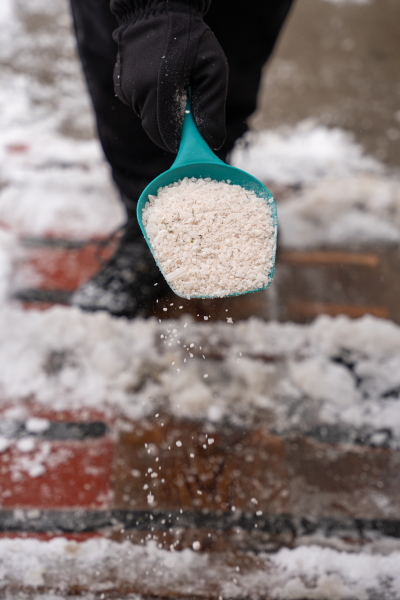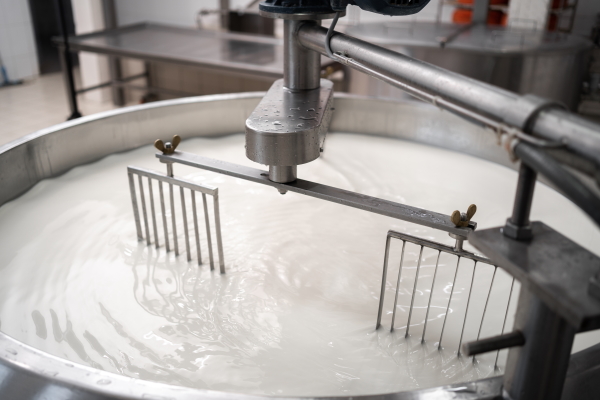Calciumchlorid ist eine anorganische Verbindung mit der chemischen Formel CaCl
2. Es handelt sich um ein Salz, das aus Calcium- und Chloridionen besteht. Im Folgenden finden Sie einige wichtige Fakten und Informationen über Calciumchlorid.
Chemische Eigenschaften
Calciumchlorid ist ein weißer, kristalliner Feststoff bei Raumtemperatur. Es hat einen salzigen Geschmack und ist gut wasserlöslich, wobei es eine klare und farblose Lösung bildet.
Calciumchlorid bildet in Reinform farblose Kristalle und ist in wasserfreiem Zustand stark hygroskopisch. Es nimmt leicht Wasser aus der Umgebung auf und bildet dabei einen Hydrat-Komplex. Das wasserfreie Calciumchlorid löst sich in Wasser exotherm.
Gewinnung
Calciumchlorid kommt in der Natur in einigen Mineralvorkommen vor, der größte Teil wird jedoch durch die chemische Reaktion von Kalkstein (Calciumcarbonat) mit
Salzsäure gewonnen.
CaCO
3+2 HCl⟶CaCl
2+CO
2+H
2O
Anschließendes Erhitzen auf 260 °C liefert die wasserfreie Form.
Technisch wird Calciumchlorid als Abfallprodukt bei der Sodaherstellung nach dem Solvay-Verfahren – und zwar bei der Rückgewinnung des Ammoniaks aus dem dabei entstandenen Ammoniumchlorid – erhalten:
2 NH
4Cl+Ca(OH)
2⟶ 2 NH
3 + CaCl
2 + 2 H
2O
Verwendungen
- Als Lebensmittelzusatzstoff (siehe weiter unten).

- Enteisungsmittel: Calciumchlorid wird häufig als Enteisungsmittel für Straßen, Gehwege und Start- und Landebahnen von Flughäfen verwendet, insbesondere in kalten Klimazonen. Es senkt den Gefrierpunkt von Wasser und verhindert so die Eisbildung und hilft beim Schmelzen des vorhandenen Eises.
- Staubbekämpfung: Es wird auch zur Staubunterdrückung auf unbefestigten Straßen, auf Baustellen und im Bergbau eingesetzt.
- Bauwesen: Trocknung von Wohnräumen, Frostschutz & Abbindebeschleuniger in der Betonherstellung, wichtigster Einsatz ist als Staubbindemittel auf unbefestigten Straßen, wobei durch die starke hygroskopische Wirkung Feuchtigkeit aufgenommen wird und dadurch der Abtrag des Straßenstaubs verringert wird.
- Wasseraufbereitung: Es wird in Wasseraufbereitungsprozessen verwendet, um die Wasserhärte einzustellen und den pH-Wert zu kontrollieren.
- Betonbeschleunigung: Calciumchlorid wird Betonmischungen zugesetzt, um den Aushärtungsprozess zu beschleunigen, die Abbindezeit zu verkürzen und die Festigkeit und Haltbarkeit des Endprodukts zu verbessern.
- Trocknungsmittel: Aufgrund seiner hygroskopischen Eigenschaften wird Calciumchlorid als Trockenmittel verwendet, um Feuchtigkeit zu absorbieren und die Luftfeuchtigkeit in verschiedenen Anwendungen zu kontrollieren, z. B. in Trockenmitteln, Verpackungen und bei der Lagerung.
- Andere Anwendungen: Calciumchlorid wird in verschiedenen anderen Bereichen eingesetzt, z. B. in Arzneimitteln, Bohrspülungen für Öl- und Gasbohrungen, Kühlsystemen und als Trocknungsmittel in industriellen Prozessen.
Calciumchlorid in Lebensmitteln
Calciumchlorid ist eine Verbindung, die häufig in der Lebensmittelproduktion und -zubereitung verwendet wird. Es ist ein weißer, kristalliner Feststoff, der gut in Wasser löslich ist. Hier sind einige wichtige Punkte über Calciumchlorid in Lebensmitteln:
- Lebensmittelzusatzstoff: Calciumchlorid ist als Lebensmittelzusatzstoff eingestuft und wird mit der E-Nummer E509 bezeichnet. Es ist von Lebensmittelaufsichtsbehörden wie der U.S. Food and Drug Administration (FDA) und der Europäischen Behörde für Lebensmittelsicherheit (EFSA) zur Verwendung zugelassen.
- Festigungsmittel: Eine der wichtigsten Verwendungen von Calciumchlorid in Lebensmitteln ist die Verwendung als Festigungsmittel. Es trägt dazu bei, die Textur und Knackigkeit von Obst und Gemüse zu erhalten, insbesondere während der Verarbeitung und Konservierung. Es wird häufig in Produkten wie Tomatenkonserven, Essiggurken und Oliven verwendet.
- Käseherstellung: Calciumchlorid wird häufig bei der Käseherstellung verwendet. Es trägt dazu bei, die Gerinnung zu fördern und den Gerinnungsprozess zu verbessern, was zu einem festeren und konsistenteren Käsebruch führt. Bei der Käseherstellung wird es häufig der Milch vor der Zugabe von Lab zugesetzt.

- Brauereiwesen und Lebensmittelkonservierung: Calciumchlorid wird in der Brauindustrie verwendet, um die Wasserhärte zu regulieren, die sich auf den Geschmack und die Klarheit des Bieres auswirken kann. Es wird auch als Konservierungsmittel in bestimmten Lebensmitteln verwendet, um deren Haltbarkeit zu verlängern.

- Elektrolyt-Ersatz: In Sportgetränken und Elektrolytgetränken wird Calciumchlorid manchmal zugesetzt, um die bei körperlicher Betätigung oder Schwitzen verlorenen Elektrolyte wieder aufzufüllen. Es trägt dazu bei, das Mineralgleichgewicht im Körper aufrechtzuerhalten.
- Medizin: bei Calciummangelzuständen und folgender Hyperkaliämie
Auswirkungen auf Mensch und Umwelt
Obwohl Calciumchlorid im Allgemeinen als sicher gilt, ist es wichtig, vorsichtig damit umzugehen. Es kann Haut- und Augenreizungen verursachen und sollte von empfindlichen Bereichen ferngehalten werden. Das Verschlucken großer Mengen kann zu Magen-Darm-Beschwerden führen. Außerdem wirkt es korrosiv auf Metalle, so dass es nicht mit bestimmten Materialien in Berührung kommen sollte.
Calciumchlorid kann die Umwelt beeinträchtigen, wenn es nicht verantwortungsbewusst verwendet wird. Es kann zur Anreicherung von Chlorid in Böden und Gewässern beitragen, was negative Auswirkungen auf Pflanzen, Wasserlebewesen und Süßwasserressourcen haben kann. Eine ordnungsgemäße Anwendung und Bewirtschaftung sind wichtig, um die Auswirkungen auf die Umwelt zu minimieren.
Für mehr Informationen zu Calciumchlorid oder zwecks einer Anfrage
kontaktieren Sie uns bitte.
 www.donauchem.at
www.donauchem.at